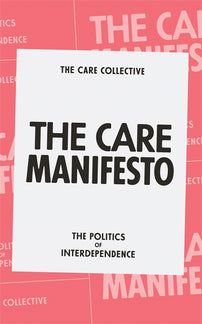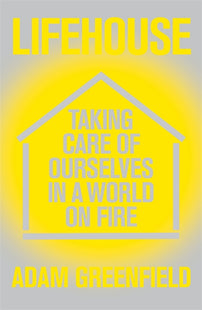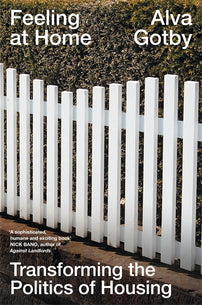Care-stripping: Beyond the Pretence of Care
Five years after the publication of The Care Manifesto, The Care Collective reflects on post-pandemic systematic "care-stripping" across the political stage.

Five years ago, we published The Care Manifesto: The Politics of Interdependence. It was a small volume that provided a large overview of what we described as the ‘structural carelessness’ of our world. More importantly, it also offered a vision of an alternative world organised around the politics of care on multiple scales, from the intimate to the global. To our surprise, the Manifesto struck a chord, reaching a popular global audience and selling tens of thousands of copies. It was translated into a dozen languages and kept the five of us very busy on public platforms.
The Care Manifesto was clearly timely: we were in the midst of the global Covid-19 pandemic and ‘care talk’ was appearing everywhere—from admonishments to ‘take care’ to the daily clap for carers. Some of this – like the UK government applauding nurses whilst cutting their pay, or corporate enthusiasm for BLM – was primarily merely ‘care-washing’. But a great deal of it – mutual aid groups, caring about inequality - was genuine and important. For so many, there was a shared sense that the world was in crisis: and that collectively we needed to drastically change our cultural, political and economic priorities.
Just five years on, however, we find ourselves in a very different political reality. We are in the midst of what we would describe as a radical and accelerated 'care-stripping'. This involves the systematic dismantling of remaining care resources and provision in order to turbo-charge profit for a handful of billionaires. It involves dumping models of progressive care by governments who are either run by these few billionaires or who fear them. Adequate care is restricted to those with the financial resources to pay for it.
In other words, even the pretence of caring has been junked by so many actors on the political stage. The most important lesson that could and should have been learned from the global pandemic—that interdependence is part and parcel of the human condition— has been binned. Rejecting this lesson through ruthless care stripping constitutes the very nemesis of the politics of care, and spells doom for all of us as well as the planet itself.
[book-strip index="1"]
And yet across the globe accelerated care stripping predominates in our mainstream politics and in our mainstream media. Revisiting the scalar vision laid out in The Care Manifesto, here is what we see five years on:
On the level of kinship, rather than multiplying who we care for and how we care, we see the fierce attacks on "gender ideology", now blasted from the White House. We see an intensive resurgence of patriarchal norms where women are, impossibly, supposed to provide home care in the heteronormative nuclear family. Households of queer and gender nonconforming individuals are being stripped of recognition and rights, while immigrants, protestors and asylum seekers are treated with increased hostility, deported and incarcerated without due process.
On the level of community, rather than amplifying spaces that are public, shared and co-operative, austerity politics have been rebooted in the UK and elsewhere, with massive retractions of community services and the dismantling of direct participatory democracy. Disabled, elderly and vulnerable people have been further stripped of resources, their demands now simply ignored, and carers further impoverished.
On the level of markets, rather than recreating markets to facilitate human and planetary thriving, we see the financialisation of the care economy intensifying, with far too many governments green-lighting the abusive power of asset management companies, and corporations moving away from the ‘care-washing’ of diversity initiatives and into care-stripping, increasing their profit margins, for instance, by eagerly complying with the rolling back of DEI initiatives and environmental pledges.
In terms of states, rather than creating sustainable economies, porous borders and education systems geared toward the cultivation of care, we see vicious attacks on precisely those institutions meant to create equity and equality. All forms of inequality are growing at a frightening rate and nationalistic borders are hardening. Universities in the UK are imploding due to corporate funding models, while in the US they are caving into political witchery. With tokenistic exceptions, the privatisation of essential utilities continues unabated: in the UK sewage is literally pumped into the rivers.
Global warfare has only deepened, with genocidal violence in Gaza, mass displacement and growing hunger in Sudan and destruction continuing in Ukraine. Renewed militarisation is proliferating, making money for arms companies and political despots, and protest by those who care is violently clamped down on.
On a planetary level, rather than making good on ecological promises to prevent climate breakdown, we have seen the absurd denial of climate change, and further deregulation of policies and practices that would temper some of the worst effects of irreversible climate change.
In The Care Manifesto, we outlined alternative futures to this dystopia, a future which imagines care as the centre of everything. We did this by drawing together many examples past and present of progressive practice: by emphasing collaboration, solidarity and interdependence as fundamental to any liveable future.
What hope remains for a better future must look to the dramatic disconnect between a world in which most of us know that care matters more than ever, and the political refusal to act upon this knowledge. On the ground, many people continue to practice a politics of care day in and day out. They continue to care for those broken by Covid, to support local food banks, to provide essential supplies for migrants and asylum seekers, to furnish clothes swaps and tool libraries, to feed hungry kids, and to protest genocide in Gaza.
Yet at the formal political level we overwhelmingly see a complete refusal to budge from austerity economics and capitalist fiscal policies aimed at promoting unexamined notions of "growth", which fail even to achieve even their own limited goals. The idiocy—and danger--of it all is now writ large in the obviously malignant and world-destroying policies of Trump. The only way out is of this dystopia is to put care at the core of our vision and politics, at every level. Because care is not just present in everyday compassion: it is made possible by political structures that refuse to hand over our power, our resources and our humanity to the billionaires and asset managers who are squeezing the life out of us.
[book-strip index="2"]





